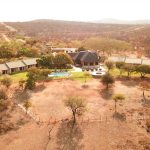OFFSHORE EXPLORATION LEGAL CHALLENGE
Shell argues a successful interdict will be detrimental to it and the country, claims no evidence of environmental harm

Lawyers argue in the hope of preventing Shell from conducting a seismic survey off the Wild Coast to explore for oil and gas.
In the Makhanda High Court on Wednesday, advocate Willie Duminy, representing the Border Deep Sea Angling Association, Kei Mouth Ski Boat Club, Natural Justice and Greenpeace Africa, argued that the approved Environmental Management Programme (EMPr) for the seismic survey makes it clear that the survey should not be undertaken during December unless that cannot be avoided, and that Shell had not established that conducting it now was unavoidable.
Duminy was arguing during the heads of argument in the urgent interim interdict hearing between the four environmental and human rights groups and the Department of Mineral Resources and Energy, the Department of Forestry, Fisheries and Environment, Shell and Impact Africa.
Duminy argued that the necessary mitigation measures had not been taken — in particular, many fishing organisations were not informed of the survey as the EMPr required, and there was no evidence of any attempt to identify and inform potential interested and affected parties.
Duminy said the applicants had demonstrated a strong case for review.
“They have also demonstrated the prospect of substantial harm to the receiving environment, based on statements derived from the EMPr itself. The harm to the receiving environment does not seem to be capable of being repaired and cannot be addressed by any subsequent remedy. Shell’s answer is that the applicants exaggerate the environmental impacts, not that they are repairable,” he said.
Duminy submitted that it was not only the prejudice to the applicants personally that should be weighed, but also the prejudice to the interest of protecting the environment that they represented.
“The likely harm to the environment and the concomitant interests of the applicants has been established,” he said.
He submitted that the only way of affording the applicants any redress in respect of the proposed seismic survey in December was to treat this application as urgent.
The potential for seismic surveys to cause irreparable harm to the Wild Coast’s marine environment during December (and particularly to migrating humpback whales and other cetaceans), was the central issue in the (virtual) hearing before Acting Judge Avinash Govindjee on Wednesday afternoon.
The Ministry of Mineral Resources and Energy’s legal representative, advocate Albert Beyleveld, and Shell’s legal representative, advocate Adrian Friedman, argued that the applicants had neither proved that the seismic survey would cause significant harm nor that the harm would be irreparable.
Friedman said if an interim interdict were granted stopping Shell from starting the survey in December, it would not be able to complete the survey within the window of suitable time within 2022.
“Shell may then have to walk away from the project and that would be detrimental to Shell and to the country. The applicants had deliberately brought the case on a hyper-urgent basis in order to gain an unfair advantage and obtain an interim interdict that would achieve the ulterior objective of effectively stopping the project,” he said.
Beyleveld said the applicants became aware of the survey on 29 October and had a month where they did nothing to halt it.
“There is no catastrophe and the application should be struck off the roll,” he said.
Friedman said seismic surveys had been conducted around the world for more than 50 years and had been the subject of extensive peer-reviewed scientific research for 15 years.
“In all of this time, and with all of this research, there has been no evidence of any significant impact on marine populations. Even more importantly, there have been at least 35 3D seismic surveys [ie, of the same type at issue in this application] conducted in South Africa, 11 of which have been conducted in the last five years. There is no evidence that any of these has caused any serious injury, death or stranding of marine life. In 2020, 325 seismic surveys have been conducted globally without any reports of death or irreversible harm to marine life,” he said.
Friedman said the question was: “What is the urgency in the current attempt to stop this seismic survey, which did not apply to all of the others?
“None has been suggested because there is none. The applicants have been unable to demonstrate that Shell’s detailed mitigation strategy is in any way inadequate. On the applicants’ own version, they have no evidence whatsoever to suggest that Shell’s mitigation mechanisms will be deficient.
“The high watermark of their case is that they may, in the future, be able to acquire expert evidence which may establish that the mitigation mechanisms are inadequate,” said Friedman.
He said the applicants had tried to suggest that there was some prima facie irregularity with the seismic survey being conducted in December. But Shell had demonstrated in detail that, in fact, commencing now was the most appropriate step to take, from an environmental perspective, to prevent interference with whales during July to November.
“In other words, the window now selected, with the mitigation measures adopted, is the safest window in which to conduct the survey. In particular, the EMPr makes clear that the survey may be conducted in December, as long as passive acoustic monitoring is in place in December. Shell has demonstrated that it will, in fact, use passive acoustic monitoring for the duration of the survey,” Friedman said.
“The vessel is already on its way to the location and the granting of an interim interdict now will cause irreparable harm to Shell and its partners arising from the wasted expenditure and planning.
“Delay now will be likely to cause Shell to terminate its interest in the licence because it would have lost the opportunity to acquire the data which it needs to decide whether to enter the next renewal phase,” he said.
Shell had spent millions of dollars and entered into contractual obligations to be ready to commence the survey.
“This will sink if the interim interdict is granted,” Friedman said.
He said that if it were not dismissed for failure to show prejudice, the case should be struck from the roll because any urgency had been self-created.
Duminy, however, said the law regulated seismic surveys and required mitigation measures to be taken, precisely because they were harmful to the environment.
“Shell’s own EMPr establishes that harm will occur and the interdict should not be refused on the basis that the degree of harm was insufficient. Shell was not taking all the mitigation measures required by law and it would be argued at the review stage that Shell does not have the environmental authorisation that it requires under the National Environmental Management Act,” he said.
He pointed out that the applicants were motivated by a desire to protect the coastal environment, and had to make an urgent application because Shell was unwilling to give any undertakings that it would not commence the survey during December in order to reduce the risks to cetaceans.
Govindjee reserved judgment and indicated that he would deliver it at 9am on Friday. DM/OBP
[hearken id=”daily-maverick/8881″]




















 Become an Insider
Become an Insider
“The vessel is already on its way to the location and the granting of an interim interdict now will cause irreparable harm to Shell and its partners arising from the wasted expenditure and planning”.
Personally, I am much more concerned about the “irreparable harm” to this vulnerable ecosystem and local communities, than to a billion dollar global corporate famous for it disastrous environmental credentials. #tohellwithshell
I agree: To Hell with Shell.
These guys
Besides Shell’s bad environmental record, there is an apparent link between them and Chancellor House, the financier of the ANC. Also consider who the minister of the DMRE is; the dubious Mr Samson Gwede Mantashe.
The original seismic survey permission was granted to Shell in 2014. It takes Shell seven years to take it up. Now, after all this time, now they want to hurry up without delay… after seven years. Doesn’t a permission slip ever prescribe, even when the law changes in the meantime?